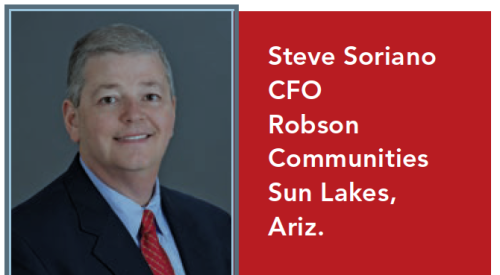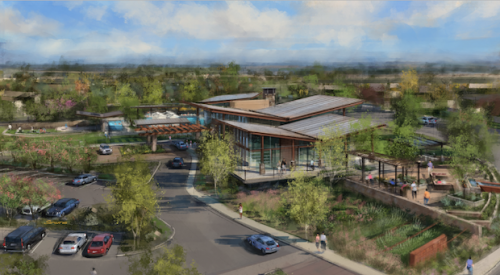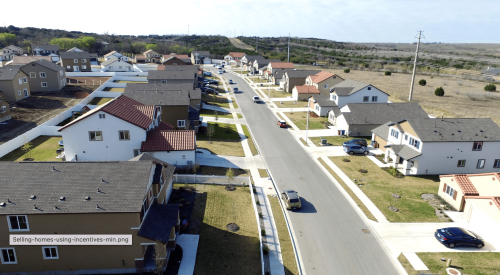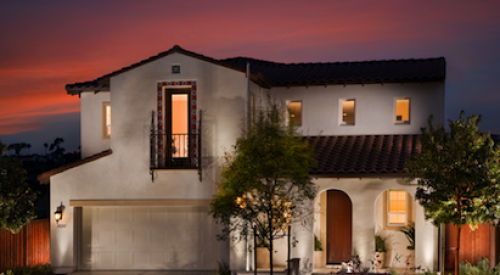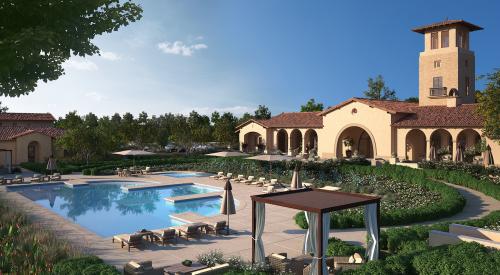| “Our strength is that we build lifestyle communities—not just homes on golf courses. We own and operate the golf course, the clubhouse and the fitness facility with our own employees. We control the whole experience people have in the community.“ —William Bone of Sunrise Colony
|
Market Expansion Pays Off
A geographic diversification program launched four years ago is paying big dividends for Sunrise Colony Co., a land developer and home builder headquartered in Las Vegas. Sunrise Colony leaped from 64th in last year’s Giant 400 to 44th this year, closing 762 homes for revenues of $378 million.
According to CEO William Bone, this impressive performance is due to projects that have been in the pipeline for a few years and are now coming to fruition. Founded in 1963, Sunrise Colony made its reputation as a builder and developer of master-planned, golf course communities, mainly in the Palm Desert, Calif. area. “By virtue of what happened in California in the early ’90s, we decided we should diversify outside of the state,” says Bone. “So we have two projects in Las Vegas and started another project two years ago in Houston.”
In most master plans, multiple builders build multiple product lines to satisfy different market segments. Sunrise Colony offers different product lines, but usually builds all the homes itself. “We do both land developing and home building, which is typical of active adult community developers, but not typical of luxury community developers, which is what we are,” he says. The average sales price in a Sunrise Colony community is $500,000-plus. “Our strength is that we build lifestyle communities—not just homes on golf courses. We own and operate the golf course, the clubhouse and the fitness facility with our own employees. We control the whole experience people have in the community.”
Sunrise Colony has been in what Bone calls “the pre-retirement business” for 30 years in Palm Desert. “In our older communities in Palm Desert today—the ones 10, 15 or 20 years old—75% of the homeowners live there full-time in retirement. We’ve sort of been on the fringes of active adult.”
Siena, in Las Vegas, is the company’s first age-restricted community, with 2000 homes, a golf course “and all the typical facilities,” and Bone is keenly interested in doing more like it. In California, Nevada and Texas, Sunrise Colony is researching the potential for both luxury golf course communities and active adult communities. “You can have them in the same markets close to each other and not compete with yourself.”
In evaluating markets for expansion, Sunrise Colony examines demographics, in-migration, job growth and other factors that impact demand—”the same kind of stuff everybody else does. But we really look closely at the population/age/income analysis of the demand side, and we also look at the supply side. How many builders are already in that marketplace supplying product meeting the needs of those people? We’re looking for markets that are not fully served by existing communities like we did in Houston and Las Vegas.
“We’re going to look at the niche where there’s not already an intense amount of supply, because the greater the supply in relationship to the demand, the tougher the margins are, and the harder it is to get the absorption,” Bone continues. “And we need high absorption to justify these communities. We need to do at least $75, $80 million a year in home sales in each community to justify the capital-intensive investment to find the land and put in all the amenities.”
As a high-volume builder/developer, Sunrise Colony finds markets like Phoenix, Las Vegas and Houston more attractive than secondary markets like Salt Lake City or Albuquerque. “If you want to build 100 homes a year, there’s lots of places you can do it. If you want to do 300 or 400 homes a year like we do, you limit your markets very dramatically.”
This summer, Sunrise Colony will start a new community in Palm Springs, Calif., and is working on entitlements for a 1500-unit, master-planned community in Denver. The company is investigating other markets but has not yet identified specific sites, says Bone. “Our primary effort is going to be to continue our internal focus on quality and systems procedures in all of our regions,” he says. “Continued expansion is sort of second to that, but it’s still important.”
Sunrise Colony’s sales got off to a good start in 2001, and Bone feels the company is in an excellent position to weather any economic turbulence. “So far, we haven’t seen the classic signs of a slowdown on the demand side. I don’t think we’re going to have a recession in the sense that we’ve had one before.”
Movers and Shakers: Emerald Builders
Movers and Shakers: Christopher Homes
Movers and Shakers: Lennar Corp.
Movers and Shakers: Village Homes
Movers and Shakers: Watermark Communities
Movers and Shakers: Orleans Homebuilders
Movers and Shakers: Habitat for Humanity

